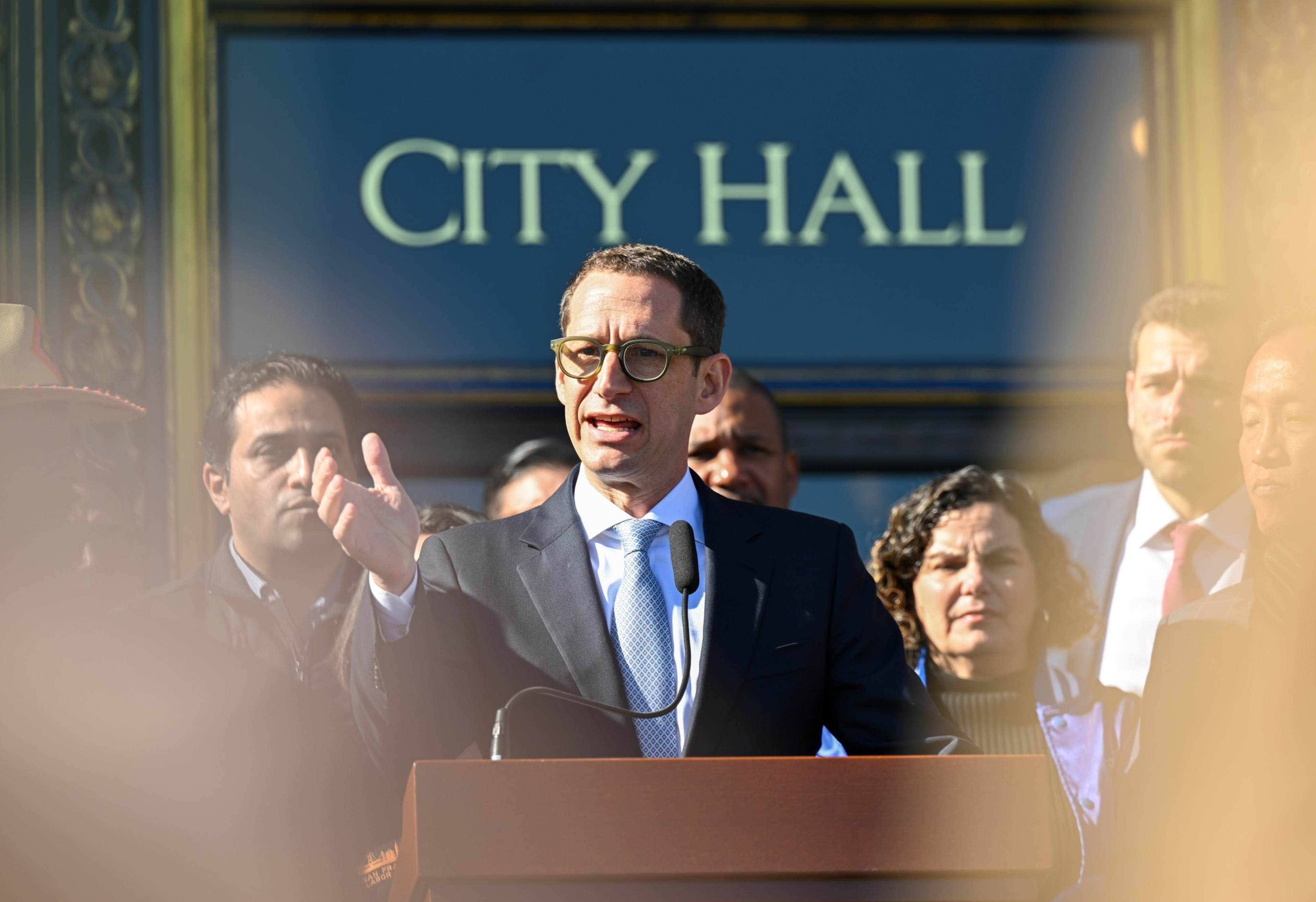Ned Segal, one of Mayor Daniel Lurie’s highest-ranking deputies, overruled city staff by unilaterally steering a lucrative contract to a tech company with longstanding ties to the mayor and his previous nonprofit, records show.
Segal, a former financial executive at Twitter who joined the Lurie administration to oversee housing and economic development, initiated an unusual process this spring and summer to reform San Francisco’s permitting system, awarding a $5.9 million contract to OpenGov.
The way the contract was awarded has troubled staffers across a number of departments. Interviews with six people knowledgeable of the deal, as well as hundreds of documents obtained via public records requests, show that a competing bid scored higher than OpenGov and would have come in at a fraction of the cost to taxpayers. The OpenGov contract was signed by Segal earlier this month at an annual cost of $4 million — on top of $1.9 million in phased payouts.
The software company was co-founded by entrepreneur and investor Joe Lonsdale and CEO Zac Bookman, who have collectively given tens of thousands of dollars over the past decade to Tipping Point Community, the nonprofit Lurie founded and ran for 15 years before later becoming mayor. Bookman also gave Lurie $500 for his mayoral campaign. According to the nonprofit’s website (opens in new tab), one member of OpenGov’s advisory board, Katherine August-deWilde, also gave up to $2.85 million to Tipping Point and now leads the mayor’s Partnership for San Francisco, a coalition of tech and business figures advising Lurie on policy.

Max Szabo, a spokesperson for Tipping Point and a political consultant to Lurie, said that OpenGov leadership has contributed more than $31,000 to Tipping Point, the bulk of which was donated nearly a decade ago. He added that these donations amount to a small percentage of the $30 million Tipping Point Community raises and spends annually.
But the Lurie administration’s interest in working with OpenGov was apparent from the start. On April 2, Segal offered Bookman a warm email introduction to the mayor’s innovation director, Florence Simon. This message went out more than a month before the city officially sought vendors for a software overhaul of San Francisco’s long-criticized permitting system.
“Zac can help us think through permitting technology,” Segal wrote, adding a smiley face to a line that noted the OpenGov CEO had been “patiently waiting for the right partner.” (The mayor’s office told The Standard that Segal also introduced other companies to the city, though no email records were provided verifying such correspondence.)

Bookman helped found OpenGov in 2012 and has known Lurie for at least a decade. In 2015, the pair were photographed at an event in which 49ers NFL Hall of Famer Ronnie Lott, a former board member who helped found Tipping Point, gave Bookman a “Visionary of the Year” award (opens in new tab).
When reached by phone, Bookman abruptly hung up and did not respond to The Standard’s emailed questions about his company’s contract with the city. OpenGov spokesperson Danielle Hoffman responded, “Our product meets the City and County of San Francisco’s needs today, and it will in the future, as we partner closely with all of our customers to innovate and shape our product roadmap.”
Lurie, Segal, and Simon declined interviews. Charles Lutvak, a spokesperson for the mayor’s office, confirmed that OpenGov’s work on the permitting system began this week and defended the city’s decision to select the company.
“OpenGov brings the technology, support system, and track record of on-time delivery as we work across departments to provide a seamless experience for business owners and residents,” Lutvak wrote in an email.

Last year, Cox Enterprises acquired (opens in new tab) a majority stake in OpenGov for $1.8 billion, significantly raising the govtech company’s profile. OpenGov counts more than 2,000-plus government agencies across the country as clients, and its technology handles everything from procurement and budgeting to open data portals that promote transparency.
If Lurie’s administration extends OpenGov’s current one-year contract, the deal to streamline San Francisco’s labyrinthian permitting system across about a dozen major departments could end up costing the city tens of millions in the years to come.
OpenGov ‘shouldn’t be considered’
Lurie campaigned last year on bringing transparency, integrity, and efficiency to City Hall, and in February, he launched one of his first major policy efforts: PermitSF (opens in new tab) intends to streamline a Kafkaesque permitting process that has played a role in multiple City Hall corruption scandals.
Currently, departments that help issue permits to businesses and homeowners use a smorgasbord of software platforms, and PermitSF’s goal is to bring the entire process under one roof.
On May 20, the mayor’s office of innovation issued (opens in new tab) a “request for information,” an informal process to assess how vendors can help on a project. The mayor’s office noted to applicants that the process was “solely for information gathering and planning purposes.”
However, the city was interested in finding companies that weren’t on its list of approved vendors, and the request for information process made this possible. As previously reported in The Standard, the city currently uses 20 different software systems, and the plan was to preserve just four.
Vendors submitted proposals by a June 13 deadline, and staff from multiple city agencies were recruited to test the different products. One of the vendors included Clariti, a software company that currently contracts with the Department of Public Works. Records show that Clariti’s software was consistently rated better by city staffers than OpenGov’s technology, and its services would cost a fraction of the contract Segal ultimately signed with OpenGov.
Clariti’s annual software license would have cost $528,000, while implementation would run up to $1.6 million. By contrast, OpenGov’s original proposal had a projected cost as high as $9.9 million.

“The general consensus of most testers is that Clariti is the most suitable of the 3 Products,” states a July report with feedback from 16 technical city staffers. The report added that OpenGov’s technology had “gaps so significant” that it “shouldn’t be considered.”
A scoring sheet shows Clariti was rated significantly higher than OpenGov in all eight technical categories, including how it handles data, security, and customer management. Across the categories, Clariti scored an average of 4.42 out of 5, while OpenGov scored 2.88. A third company, LeapThought, scored 2.5.
Other documents show similar findings, such as a July report from an employee at the city’s data agency who said they preferred Clariti. An undated document from two planning department staffers concurred. City officials did raise concerns about Clariti, including delays the Department of Public Works has experienced getting the company’s software operational. But the majority of graders for PermitSF still preferred Clariti.
In August, The Standard reported that Segal and Elizabeth Watty, who was named to lead PermitSF two months before a final decision was made, had sole discretion in awarding the contract to OpenGov. A formal contracting process would have required them to use a more objective system that weighs costs and the quality of the technology.
“Mayor Lurie launched PermitSF not to tweak that system but to fundamentally transform it,” said Lutvak, the mayor’s spokesperson. “This work requires doing things differently right now.”
‘An appearance of impropriety’
Ed Harrington, who served as San Francisco city controller for nearly two decades, called the process that netted OpenGov its contract strange and noted how uncommon it is for the mayor’s office to oversee a software procurement competition instead of the city’s technology experts.
“It is highly unusual for the mayor’s office to be directly responsible for this and signing off on these kinds of things,” Harrington said.
Sources with knowledge of the contracting process expressed frustration with how OpenGov was chosen, noting that morale across departments has plummeted as a result. One source said the permitting software is unlikely to meet Lurie’s goal of launching early next year.

“People feel like we’re going to get run over by a train in the next few months,” the source said. “And when it fails, they’re going to blame staff.”
On Aug. 26, Lurie and Segal announced in an Instagram post (opens in new tab) that the city had picked OpenGov to overhaul the city’s permitting system.
“We’re just trying to make life easier, more efficient, more effective, and deliver faster for the people of San Francisco,” Lurie said in a video (opens in new tab) that was retweeted by OpenGov’s Bookman.
Lutvak, the mayor’s spokesperson, told The Standard that Lurie, Segal, Simon, Watty, and the mayor’s chief of staff, Staci Slaughter, all signed a form affirming they had no financial interest in any of the finalists considered for the PermitSF contract, a step that he noted went beyond city requirements.
However, Joan Harrington, a former director and current fellow at the Markkula Center for Applied Ethics at Santa Clara University, said the financial ties between OpenGov and Lurie’s former nonprofit — combined with a contracting process that skirted norms — still gives off “an appearance of impropriety.”
“San Francisco is a small city and they may have personal relationships by crossing paths over the years,” Harrington said. “But there are facts here that would maybe suggest this wasn’t the best decision for the city.”

